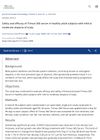TLDR Chemotherapy for leukemia led to full hair regrowth in a child with alopecia totalis.
This document reports a unique case of complete remission of alopecia totalis (AT) in a pediatric patient following chemotherapy treatment for B-cell acute lymphoblastic leukemia (B-ALL). AT, characterized by non-scarring hair loss of the entire scalp due to autoimmune reactions, typically has an unpredictable clinical course with limited effective treatments. While remission of alopecia has been observed post-hematopoietic stem cell transplantation, this is the first documented instance of AT resolving solely after chemotherapy.
 191 citations
,
May 2018 in “British journal of dermatology/British journal of dermatology, Supplement”
191 citations
,
May 2018 in “British journal of dermatology/British journal of dermatology, Supplement” Alopecia areata is likely an autoimmune disease with unclear triggers, involving various immune cells and molecules, and currently has no cure.
44 citations
,
April 2017 in “International Journal of Dermatology” No treatment is completely effective for alopecia totalis and alopecia universalis.
 185 citations
,
June 2014 in “Journal of Investigative Dermatology”
185 citations
,
June 2014 in “Journal of Investigative Dermatology” A man with severe hair loss and skin disease regrew his hair with no side effects after taking tofacitinib.
 1 citations
,
August 2022 in “JAAD case reports”
1 citations
,
August 2022 in “JAAD case reports” Tofacitinib and oral minoxidil may help treat Sisaipho alopecia areata.
 April 2022 in “Journal of Cosmetic Dermatology”
April 2022 in “Journal of Cosmetic Dermatology” Trimax-360 Serum, when used for 98 days, safely and effectively improves hair growth, thickness, and density without any side effects.
 5 citations
,
January 2020 in “Journal of Dermatology”
5 citations
,
January 2020 in “Journal of Dermatology” Temporal hair loss relates to overall scalp hair loss in women.
 41 citations
,
December 2008 in “International Journal of Dermatology”
41 citations
,
December 2008 in “International Journal of Dermatology” South Korean women with hair loss have lower hair density and thickness compared to healthy women.





